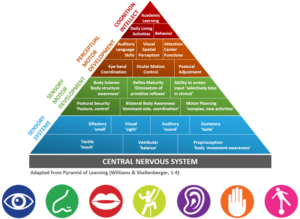Being Neurodivergent and Sensory Processing
Katie Kerley, BSc (cur.occ), PG cert Sensory Integration, MAOTI
Snr Occupational Therapist, Clinical Director of Horizons Therapy Service Ltd
Neurodivergent!
All human beings are sensory-experiencing creatures existing in a sensory rich world. The world we live in is full of sensory information, as are our own bodies. Almost all of our experiences are either informed by sensations or cause us to experience sensations.
Sensory processing is the ability to analyse, and interpret sensory information from the environment. Sensory integration is the ability to process the information and generate an adaptive or goal oriented response that is appropriate to the situation/environment. Information is processed from several sensory systems. Most of are familiar with our 5 basic senses – touch, taste, sight, smell and hearing, but there are many more!
Vestibular – is the sensory system responsible for balance, movement and spatial orientation and it is stimulated when the fluid in the semi-circular canals and the otolith of the inner ear is moved by linear, orbital and rotary movements. This impacts on balance, our relationship with gravity, our sense of movement and can have a strong connection with concentration span.
This, combined with our visual and proprioception helps us to figure out where we are in space.
Humans did not evolve to be sedentary creatures! We need movement in our lives to help us be at our best cognitively, emotionally and to make sure we get enjoyment in our lives. Get your movement in ways that are meaningful and fun, so that you can maintain this lifestyle!
Proprioception – from the Greek “proprio” meaning self, perception of self, physical self This receives feedback from and sends information to our muscles, joints and tendons. This system is responsible for one’s own perception of the body and has an effect on co-ordination and how we physically interact with our environment. It receives information related to calibration of force, body position, muscle tension and body movement. Think resistance! Pushing, pulling, dragging, lifting! It can help us feel more “present” and oriented in our body and thus help orient us in time and space.
The proprioceptive system develops more through motor experiences across the life-span.
Tactile – is how we interpret touch and information from our skin – touch, vibration, pressure. This system helps us keep ourselves safe and helps us bond with other humans. You might notice that you happy with a certain type of touch from a person you care about, but not with someone else. This is quite typical.
Being sensitive to touch can sometimes impact on our food and clothing preferences and can be connected with stress. It can cause autonomic nervous system changes which will cause you to experience a stress-like response. This varies based on our mood, how well we are, our baseline stress and our relationships.
Auditory – is how we interpret and respond to what we hear. If you are sensitive, your auditory processing may also cause you to be bothered by certain sounds that other people may find inoffensive. Like the tactile system, being sensitive to auditory input can cause an autonomic nervous system change which will cause you to experience a stress-like response. Prolonged exposure to noxious auditory stimuli can culminate in sensory overload/ meltdown or stress. It is important to note that it is not always the volume of the sound that is noxious, but the complexity (e.g. multiple sounds layered over each other like voices in a crowd or a TV and radio being on at the same time) or the pitch.
There are many auditory experiences we can really enjoy – music being the prime example!
Visual – is how the brain interprets visual information (it is not the same as visual acuity which is related to eyesight). We can be sensitive to visual information (especially bright lights and busy or crowded visual environment ) – this can cause us to feel overwhelmed or overloaded. Sometimes we enjoy certain type of visual stimulation – e.g. admiring a painting, enjoying fireworks etc.
Olfactory/ gustatory – these are smell and taste. Many of us have preferences for what we life to smell and taste and this is part of being human!
Interoception – this is our perception of our internal states. – hunger, thirst, fatigue, sleep/wake cycle, need to go to the bathroom, internal pain, pleasure etc.
There are others, such as chronoception (perception of time), thermoception (perception of temperature) and more!
Neurodivergent people tend to experience information from their senses differently to how neurotypicals do. This can impact our emotional state and have an effect on our stress levels.
It is good to understand your own sensory processing, as well as the fact that it can change even within a single day. You may seek more intense information from some senses and be more avoidant in other. Or you might notice that even this fluctuates.
Our sensory processing and our emotions are inextricably linked at all stages throughout our lives. What we sense, triggers emotion.
Sensory input informs our emotions, and our emotions impact how we process sensory information e.g. “I see something moving in the shadows, I feel afraid!” or “that hug feels nice, I feel comforted” or “that food smells good, I feel hungry”.
Time of stress or highly emotional circumstances, will make our sensory processing more fragile and make us more prone to overload/ meltdown/ shutdown. It’s important to know this and to prepare some strategies in advance if you can.
Making sure you, as a feeling, thinking, sensing human, get your sensory needs met through meaningful occupation is very important. Only you know what activities are meaningful to you. Make sure to incorporate hobbies, self-care, stimming, rest, and mental stimulation to help manage your sensory processing.

